Related Research Articles

Richard Boyle, 1st Earl of Burlington, 2nd Earl of Cork was an Anglo-Irish nobleman who served as Lord High Treasurer of Ireland and was a Cavalier.
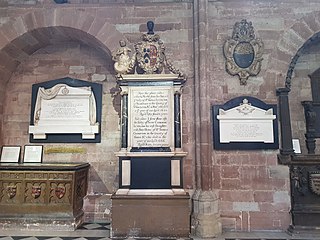
Sir Thomas Lyttelton, 1st Baronet was an English Royalist officer and politician from the Lyttelton family during the English Civil War.

}} Sir Hardress Waller, c. 1604 to – 1666, was born in Kent and settled in Ireland during the 1630s. A first cousin of Parliamentarian general William Waller, he fought for Parliament in the Wars of the Three Kingdoms, becoming a leading member of the radical element within the New Model Army. In 1649, he signed the death warrant for the Execution of Charles I, and after the Stuart Restoration in 1660 was condemned to death as a regicide.

John Bramhall, DD was an Archbishop of Armagh, and an Anglican theologian and apologist. He was a noted controversialist who doggedly defended the English Church from both Puritan and Roman Catholic accusations, as well as the materialism of Thomas Hobbes.
Christopher Wandesford was an English administrator and politician who sat in the House of Commons between 1621 and 1629. He was Lord Deputy of Ireland in the last months of his life.

Sir Michael Livesey, 1st Baronet, also spelt Livesay, was a Puritan activist and Member of Parliament who served in the Parliamentarian army during the Wars of the Three Kingdoms. He was one of the regicides who approved the Execution of Charles I in January 1649.

Thomas Wentworth, 1st Earl of Cleveland, was an English landowner and Royalist general during the Wars of the Three Kingdoms, described by one historian as a "much under-rated field commander". A distant relative of Thomas Wentworth, 1st Earl of Strafford, executed by Parliament in May 1641, his son Thomas Wentworth, 5th Baron Wentworth, also served in the Royalist army and predeceased him in March 1665.
Thomas Wentworth, 5th Baron Wentworth, KB, PC was an English landowner and soldier who supported the Royalists during the Wars of the Three Kingdoms. At the end of the First English Civil War in 1646, he accompanied the future Charles II of England into exile and fought with him at the Battle of Worcester in 1651.

Sir John Borlase, 1st Baronet of Bockmer, Medmenham, Buckinghamshire was an English politician who sat in the House of Commons between 1640 and 1644. He supported the Royalist cause in the English Civil War.

Thomas Dillon, 4th Viscount DillonPC (Ire) (1615–1673) held his title for 42 years that saw Strafford's administration, the Irish Rebellion of 1641, the Irish Confederate Wars and the Cromwellian Conquest of Ireland. He was a royalist and supported Strafford and Ormond. He sided with the Confederates for a while but was a moderate who opposed Rinuccini, the papal nuncio.
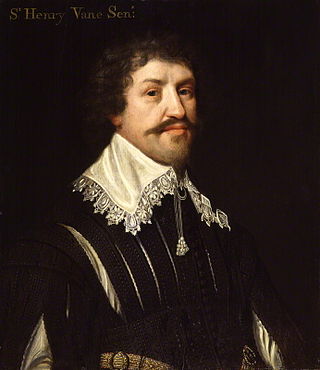
Sir Henry Vane, known as the Elder to distinguish him from his son, was an English politician who sat in the House of Commons at various times between 1614 and 1654. He served King Charles in many posts including secretary of state, but on the outbreak of the English Civil War joined the Parliamentary cause. He was the third cousin of Francis Fane, 1st Earl of Westmorland.
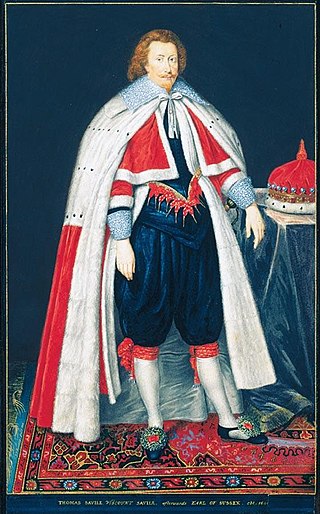
Thomas Savile, 1st Earl of Sussex was an English politician.
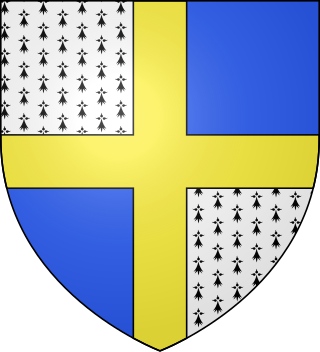
Sir Edward Osborne, 1st Baronet, of Kiveton was an English politician who sat in the House of Commons at various times between 1628 and 1640.

Sir Alexander Denton was an English politician who sat in the House of Commons variously between 1625 and 1644. He supported the Royalists during the English Civil War. He also has a house at a grammar school in Buckinghamshire
Sir John Baker, 2nd Baronet was an English politician who sat in the House of Commons of England in 1640. He supported the Royalist side in the English Civil War.

Sir Thomas Whitmore, 1st Baronet was an English politician who sat in the House of Commons of England between 1640 and 1644. He supported the Royalist side in the English Civil War.
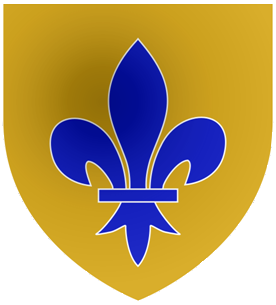
Sir William Portman, 5th Baronet was an English politician who sat in the House of Commons from 1640 to 1644. He supported the Royalist side in the English Civil War.

Sir William Savile, 3rd Baronet of Thornhill was an English politician who sat in the House of Commons between 1640 and 1642. He fought on the Royalist side in the English Civil War and was killed in action.

William Ogle, 1st Viscount Ogle was an English soldier from Northumberland who settled in Hampshire and was Member of Parliament for Winchester from 1640 to 1643. He served in a number of wars and was Royalist governor of Winchester from 1643 to 1645.
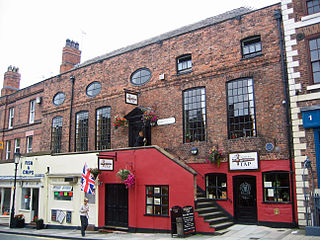
Sir Francis Gamull, 1st Baronet (1606–1654) was an English politician who sat in the House of Commons from 1640 to 1644. He supported the Royalist side in the English Civil War and was active in the defence of Chester.
References
- 1 2 Cracroft′s Peerage
- ↑ Willis, Browne (1750). Notitia Parliamentaria, Part II: A Series or Lists of the Representatives in the several Parliaments held from the Reformation 1541, to the Restoration 1660 ... London. pp. 229–239.
- ↑ Parishes: St Nicholas (Thanet), The History and Topographical Survey of the County of Kent: Volume 10 (1800), pp. 237–253. Date accessed: 1 February 2011